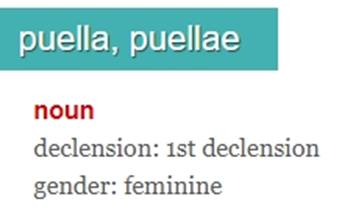Almost every 3rd declension noun in this text has been
covered in earlier posts. They are listed for reference. Read the text for
understanding – the translation is in the comments – and focus on the nouns in
bold, work out what cases they are in, and why they are in those cases.
DĒ PRĪNCIPIBUS RŌMĀNĪS
[Chesnutt: the Road to Latin (1933)]
In prīncipiō Rōma ā rēgibus regēbātur. Prīmus rēx erat
Rōmulus. Frāter Rōmulī erat Remus. Rōmulus et Remus erant geminī. Pater
Rōmulī et frātris Remī deus Mārs, māter Rhēa Silvia erat. Rōmae
erant statuae patris Mārtis et mātris Rhēae Silviae et frātrum.
Rōmulus erat rēx bonus et ā Rōmānīs laudābātur. Erant septem rēgēs
Rōmānī. Posteā erant cōnsulēs. Cōnsul Rōmānus ā populō Rōmānō
dēligēbātur. Imperium cōnsulis erat maximum. Duō cōnsulēs quotannīs
dēligēbantur et cīvitātem regēbant. Posteā imperātōrēs Rōmam
regēbant. Imperātor clārus erat Augustus Caesar. Rōmae erat magna
statua imperātōris Augustī Caesaris.
Vocabulary
[i] 3rd declension nouns
Caesar, -is [3/m]: Caesar
cīvitās, cīvitātis [3/f]: state; this is a word that can
cause a bit of head-scratching since it has a variety of meanings dependent
upon context e.g. a city and its surrounding territory, a city state, a
kingdom, tribe.
cōnsul, -is [3/m]: consul
frāter, frātris [3/m]: brother
imperātor, imperātōris [3/m]: (here) emperor, but it has
other meanings e.g. commander; commander-in-chief; ruler; the title could be
given to conferred on a military leader who had won his first great victory.
That could be as a result of his own soldiers greeting him that way, or it was
decreed by the Senate. You could not use the term “emperor” as we understand it
in Republican Rome, because they didn’t have emperors.
Mārs, Mārtis [3/m]: Mars (god)
māter, mātris [3/f]: mother
pater, patris [3/m]: father
prīnceps, prīncipis [3/m]: chief; leader
rēx, rēgis [3/m]: king
[ii] other words
clārus, -a, -um:
dēligō, dēligere [3]: choose
geminus, -ī [2/m]: twin
maximus, -a, um: greatest; very great
prīncipium, -ī [2/n]: beginning
quotannīs: yearly; every year
regō, regere [3]: rule
Notes
[1] Rōmae [locative] erant statuae … In Rome
there were statues …
[2] Passive voice: introduction
- In
prīncipiō Rōma ā rēgibus regēbātur. In the beginning Rome was
governed by kings.
- Rōmulus
… ā Rōmānīs laudābātur. Romulus … was praised by
the Romans.
- Cōnsul
Rōmānus ā populō Rōmānō dēligēbātur. The Roman consul was
elected by the Roman people.
- Duō
cōnsulēs quotannīs dēligēbantur. Two consuls were elected every
year
What you see here is called in grammar the passive
voice (or you can just say passive).
A sentence – both in English and Latin – can be [i] active or
[ii] passive.
[i] Active: the subject of the sentence is performing the
action.
The teacher punishes the pupil.
[ii] Passive: the subject of the sentence is not performing
the action but the action is being done to the subject.
The pupil is punished ¦ by the teacher.
The passive in Latin involves some work – but in stages. The
first point to consider is that, when you’re reading the authors, very often
they are talking about other people i.e. the 3rd person e.g. he is praised by
the king, they were elected by the people. To create those particular forms,
all you do is add -ur to the the 3rd person singular or plural of the verb.
laudat: he praises
> laudātur: he is praised; /long ā/: a
small point because written Latin did not use the macron sign, but, if you’re
aiming for spot-on pronunciation, then it’s quite strongly said: lau-DA-tur
laudant: they praise
> laudantur: they are praised
castīgābat: he was punishing
> castīgābātur: he was being punished /long
ā/
regēbant: they used to rule; they were ruling
> regēbantur: they used to be ruled
Magister [nominative: subject of the sentence] discipulum [accusative:
direct object] castīgat. The teacher punishes the student.
> Discipulus [now the subject of the
sentence: nominative] ¦ ā magistrō [ablative] ¦
castīgātur. The student is (being) punished ¦ by the
teacher.
“by the teacher” is known in grammar as the passive
agent i.e. the person by whom something is done; in
Latin, when you say something is being done by a person, you
use ā + ablative.
Rōmānī Rōmulum laudābant. The Romans used to praise Romulus.
> Rōmulus ¦ ā Rōmānīs ¦
laudābātur. Romulus was praised ¦ by the Romans.
That -ur ending stands out from the crowd and
marks a passive. Of course, other parts of the verb have a passive too which
form in a slightly different way, but, for now, this opens the door to the
passive.
A small quiz question: in the text Romulus is described as
being a good king and praised by the people. But no further mention is made of
Remus. Why is that?
____________________
In the beginning Rome was governed by kings. The first king
was Romulus. The brother of Romulus was Remus. Romulus and Remus were twins.
The father of Romulus and (his) brother Remus was the god Mars, the mother Rhea
Silvia. In Rome were the statues of the father Mars and the mother Rhea Silvia
and the brothers. Romulus was a good king and was praised by the Romans. There
were seven Roman kings. After that were the consuls. The Roman consul was
elected by the Roman people. The consul’s political authority was the greatest.
Two consuls were elected every year and governed the city. Afterwards emperors
ruled Rome. Augustus Caesar was a famous emperor. In Rome there was a great
statue of the emperor Augustus Caesar.
____________________


































